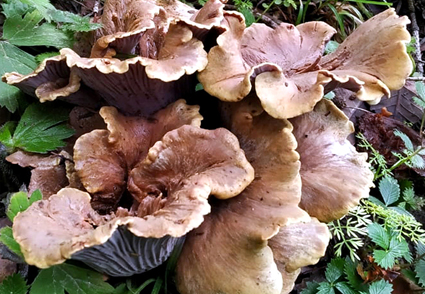Abstract
Gomphus indicus is proposed here as a new species based on morphological characteristics and phylogenetic analyses of the nuclear rDNA internal transcribed spacer and large subunit of the rDNA region. The combination of morphological and molecular data confirmed the novelty of the species and its infrageneric placement within the genus Gomphus Pers. This species was found in association with Cedrus deodara (Roxb. ex D. Don) G. Don and Abies pindrow (Royle ex D. Don) Royle and is characterized by infundibuliform to flabelliform pileus with wavy irregular margins, greyish yellow to light yellow, wrinkled rugose pileus surface, cylindrical to bacilliform large basidiospores (15–21.5 × 6–8 µm) with irregular isolated warts, the absence of hymenial cystidia, and pileipellis composed of thin-walled, loosely interwoven hyphae. A detailed description, illustrations, and comparisons with morphologically similar and related taxa are provided here. Additionally, a worldwide key to the globally known species of Gomphus is also provided.
References
- Edler, D., Klein, J., Antonelli, A. & Silvestro, D. (2021) RaxmlGUI 2.0: a graphical interface and toolkit for phylogenetic analyses using RAxML. Methods in Ecology and Evolution 12 (2): 373–377. https://doi.org/10.1111/2041-210X.13512
- Fan, X.P., Liu, J.W. & Yang, Z. (2023) Phylogeny, Taxonomy and Evolutionary Trade-Offs in Reproductive Traits of Gomphoid Fungi (Gomphaceae, Gomphales). Journal of Fungi 9 (6): 626. https://doi.org/10.3390/jof9060626
- Gardes, M. & Bruns, T.D. (1993) ITS primers with enhanced specificity for Basidiomycetes: Application to identification of mycorrhizae and rusts. Molecular Ecology 2: 113–118. https://doi.org/10.1111/j.1365-294X.1993.tb00005.x
- Giachini, A.J. (2004) Systematics, phylogeny, and ecology of Gomphus sensu lato. Ph.D. Dissertation. Corvallis: Oregon State University. pp. 470.
- Giachini, A.J. & Castellano, M.A. (2011) A new taxonomic classification for species in Gomphus sensu lato. Mycotaxon 115: 183–201. https://doi.org/10.5248/115.183
- Giachini, A.J., Camelini, C.M., Rossi, M.J., Soares, C.R.F. & Trappe, J.M. (2012) Systematics of the Gomphales: the genus Gomphus sensu stricto. Mycotaxon 120: 385–400. https://doi.org/10.5248/120.385
- Giachini, A.J., Hosaka, K., Noura, E.R., Spatafora, J.W. & Trappe, J.M. (2010) Phylogenetic relationships of the Gomphales based on nuc25S-rDNA, mit-12S-rDNA and mit-ATPg-DNA combined sequences. Fungal Biology 114: 224–234. https://doi.org/10.1016/j.funbio.2010.01.002
- Hall, T.A. (1999) BioEdit: a user-friendly biological sequence alignment editor and analysis program for Windows 95/98/NT. Nucleic Acids Symposium Series 41 (41): 95–98.
- Humpert, A.J., Muench, E.L., Giachini, A.J., Castellano, M.A. & Spatafora, J.W. (2001) Molecular phylogenetics of Ramaria (Gomphales) and related genera: evidence from nuclear large subunit and mitochondrial small subunit rDNA sequences. Mycologia 93: 465–477. https://doi.org/10.2307/3761733
- Katoh, K. & Standley, D.M. (2013) MAFFT multiple sequence alignment software ver. 7: improvements in performance and usability. Molecular Biology and Evolution 30: 772–780. https://doi.org/10.1093/molbev/mst010
- Kornerup, A. & Wanscher, J.H. (1978) Methuen Handbook of Colour, 3rd edn. Eyre Methuen Ltd., London, U.K. pp. 252.
- Largent, D., Johnson, D. & Watling, R. (1977) How to identify mushrooms to genus III: microscopic features. Mad River Press Inc., Eureka, California. pp. 122.
- Liu, J.W., Luangharn, T., Wan, S.P., Wang, R. & Yu, F.Q. (2022) A new edible species of Gomphus (Gomphaceae) from southwestern China. Mycoscience 63 (6): 293–297. https://doi.org/10.47371/mycosci.2022.09.002
- Persoon, C.H. (1797) Tentamen dispositionis methodicae fungorum in classes, ordines, genera etfamilias. Leipzig: Petrum Philippum Wolf. https://doi.org/10.5962/bhl.title.42674
- Petersen, R.H., Hughes, K.W., Justice, J. & Lewis, D.P. (2014) A new species of Gomphus from southeastern United States. North American Fungi 9: 1–13. https://doi.org/10.2509/naf2014.009.009
- Petersen, R.H. (1971) The genera Gomphus and Gloeocantharellus in North America. Nova Hedwigia 21: 1–118.
- Petersen, R.H. (1972 “1971”) Interfamilial relationships in the clavarioid and Cantharelloid fungi. In: Petersen, R.H. (Ed.) Evolution in the higher Basidiomycetes. University of Tennessee Press, Knoxville. pp. 345–374.
- Tamura, K., Stecher, G., Peterson, D. Filipski, A. & Kumar, S. (2013) MEGA6: molecular evolutionary genetics analysis version 6.0. Molecular Biology and Evolution 30 (12): 2725–2729. https://doi.org/10.1093/molbev/mst197
- Vilgalys, R. & Hester, M. (1990) Rapid genetic identification and mapping of enzymatically amplified ribosomal DNA from several Cryptococcus species. Journal of Bacteriology 172 (8): 4238–4246. https://doi.org/10.1128/jb.172.8.4238-4246.1990
- Villegas, M., Cifuentes, J., Estrada-Torres, A. & Kong, A. (2010) The genus Gomphus in tropical and subtropical zones of Mexico. Nova Hedwigia 90: 491–501. https://doi.org/10.1127/0029-5035/2010/0090-0491
- White, T.J., Bruns, T., Lee, S. & Taylor, J. (1990) Amplification and direct sequencing of fungal ribosomal RNA genes for phylogenetics. In: Innis, M.A., Gelfand, D.H., Sninsky, J.J. & White, T.J. (Eds.) PCR Protocols: a guide to methods and applications. Academic Press, San Diego, New York. pp. 315–322. https://doi.org/10.1016/B978-0-12-372180-8.50042-1


